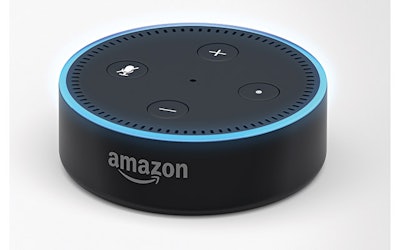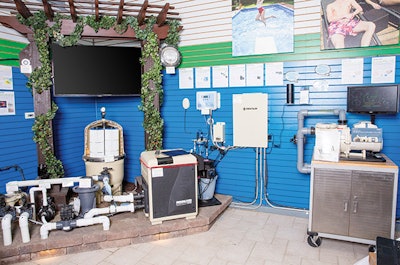
Advances in home automation have accelerated in recent years, as the idea of buying products to automatically perform tasks around the home has caught on, especially with younger homeowners. Alongside this movement has been the rapid growth of intelligent voice command devices such as Amazon Echo and Google Home, which can be used to control a "smart" home.
Voice command devices now direct the performance of a vast array of mundane, traditional home tasks — everything from adjusting the lighting and engaging the automatic vacuum to firing up the coffee maker or cranking up your favorite song.
Savvy pool and spa companies are looking to cash in on the trend by making backyard equipment controllable in the same manner. For those with customers who crave such control capability, it represents a real opportunity.
At the moment, the potential market may be limited to the younger generation and early adopters, but if you trace the history of technology, you quickly realize that we are always moving toward higher levels of automation and control, in almost everything.
RELATED: Why Automation is Not Optional
Thus, some companies are learning about and selling voice control for the backyard, and for a variety of reasons — certainly for the direct profit of the sale, but also because Alexa (the silky, disembodied voice of Amazon Echo) is cool. And it can't hurt to be among the first to arrive where the market is going.
One company that has jumped on voice-activated pool and spa control is All Seasons Pools & Spas (Orland Park, Ill.). They've got an Amazon Echo set up right in the store, hooked up to a mock equipment pad.
Although there's no actual water running through the pipes, colored rope lights represent moving water and activation of different components. It's a clever model of a working pool setup.
"We put the display near the sales desks," says company vice president Dan Lenz, "so when a sales guy is sitting at a desk with a customer, the sales guy just says, 'Alexa turn the pool light on.' And it comes on.
"And when he tells Alexa to turn the heater on, the red lights in the heater cutaway come on. It's an exciting thing for the right age group."
 The set up at All Seasons: At a word from a salesperson, the pool lights come on and equipment comes to life, demonstrating the voice command technology.
The set up at All Seasons: At a word from a salesperson, the pool lights come on and equipment comes to life, demonstrating the voice command technology.
She Got Skills
Unlike Napoleon Dynamite, Alexa has "skills," or functional abilities. Alexa comes out of the box with the skills to stream music, control smart lighting and tell you the weather, among a host of other functions. (Including, of course, the ability to order a million more products from Amazon, just by uttering the words.)
But most of Alexa's potential for home control comes from third-party manufacturers that build skills for Alexa so she can control their piece of equipment.
Major manufacturers of pool and spa equipment have developed these skills so when the homeowner says, "Alexa, turn my pool lights on," that phrase triggers a command in their standard pool control and automation system, and voila, the backyard is illuminated.
RELATED: Hayward OmniLogic Now Offers Skill for Amazon Alexa
How To Talk To Her
"I have it in my home," Lenz says. "And I may be sitting on my couch and I'll ask her what the pool temperature is, or to turn my heater on (I don't keep the pool heated unless I know we're going to be using it). I'll just say, "Alexa, turn my pool lights on." And she gets it, and does it.
Just as in talking with a real person, phrasing is important if you want to communicate effectively with an intelligent device like Alexa. Lenz says you have to think a little bit before you speak. His description of the process would be familiar to many couples:
"You have to understand how to talk to her," he says. "There are certain ways you have to say things to get the results you're looking for."
"For instance, like in the example I just used, you have to tell her to 'ask Pentair' to do something. But once you know how talk to her in the right way, it works really well.
"For instance, you quickly discover if you say, 'turn the pool pump on,' instead of "turn on the pool pump" you get better results. (She wants the object first.)
The Slow Embrace
Most labor-saving technologies such as this one follow a familiar trajectory. They usually find limited initial acceptance among early adopters (typically young adults and tech geeks), followed in due time by the general embrace of the mainstream public.
Lenz sees a similar dynamic playing out with voice command systems. "Right now, most of our customer base is in the 35-55 age range, and even 35-year-olds are a little beyond the primary group. They may enjoy the novelty of it, but they don't really look for functionality in that technology.
"On the other hand, my service manager is in her mid-twenties, and she is all over Google Home. She does her shopping lists and other things on it, and I think that generation expects to use this kind of technology extensively."
RELATED: Introducing the Unknown Control












































